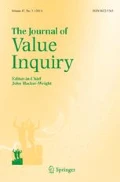Notes
See John R. Perry, A Dialogue on Personal Identity and Immortality (Indianapolis: Hackett Publishing Company, 1978).
See David DeGrazia, Human Identity and Bioethics (Cambridge, England: Cambridge University Press, 2005).
Ibid., p. 16.
See Sydney Shoemaker, “Persons and Their Past,” American Philosophical Quarterly, vol. 7 (1970), pp. 269–285; see also John Perry, “Can the self Divide?” Journal of Philosophy, vol. 69, no. 16 (1972), pp. 463–488; Amelie Rorty, ed., The Identities of Persons (Berkley, Calif.: University of California Press, 1976); Derek Parfit, Reasons and Persons (Oxford: Oxford university Press, 1984).
See Simon Beck, “Parfit and the Russians,” Analysis, vol. 49 (1989), p. 206.
Allen Buchanan and Dan Brock, Deciding for Others (Cambridge, England: Cambridge University Press, 1989), p. 155. See also DeGrazia, op. cit., ch. 5.
Buchanan and Brock, op. cit., p. 152.
Ibid., 159.
Ibid., 159.
See Ronald Dworkin, Life’s Dominion: An Argument about Abortion, Euthanasia, and Individual Freedom (New York: Knopf, 1993), ch. 8; see also Norman L. Cantor, “Prospective Autonomy: On the Limits of Shaping One’s Postcompetence Medical Fate,” Journal of Contemporary Health, Law and Policy, vol. 13 (1992), pp. 34–48.
Ronald Dworkin, “Autonomy and the Demented Self,” The Milbank Quarterly 64, vol. 2 (1986), p. 9.
Rebecca Dresser, “Advance Directives Implications for Policy,” The Hastings Center Report, vol. 24, no. 6 (1994), pp. S2–S5.
Rebecca Dresser, “Missing Persons: Legal Perceptions of Incompetent Patients,” Rutgers Law Review, vol. 46 (1994), p. 615.
Derek Parfit, op. cit.
Ibid., p. 217.
Ibid., p. 206.
See Llyod Fields, “Parfit on Personal Identity and Desert,” The Philosophical Quarterly, vol. 37 (1987), pp. 432–441.
See Andrew Firlik, “Margo’s Logo,” JAMA, vol. 265 (1991), p. 201; see also Rebecca Dresser, “Dworkin on Dementia, Elegant Theory, Questionable Policy,” The Hastings Center Report, vol. 25 (1995), pp. 32–38; Ronald Dworkin Life’s Dominion, ch. 8.
See Dworkin, Life’s Dominion, ch. 8.
Buchannan and Brock, op. cit., p. 153.
Ibid.
See Timothy Wilson and Daniel Gilbert, “Affective Forecasting,” Advances in Experimental Social Psychology, vol. 35 (2003).
Buchannan and Brock, op. cit., p. 154.
Ibid., ch. 3.
Ibid., p. 186.
Ibid., pp. 186–187.
See Rebecca Dresser, “Bound to Treatment: The Ulysses Contract,” The Hastings Center Report, vol. 14 (1984), pp. 13–16.
Buchanan and Brock, op. cit., p. 187.
Ibid., pp. 295–296.
We would like to thank Thomas Magnell, Editor-in-Chief of the Journal of Value Inquiry, and three anonymous reviewers for their helpful suggestions.
Author information
Authors and Affiliations
Corresponding author
Rights and permissions
About this article
Cite this article
Gligorov, N., Vitrano, C. The Impact of Personal Identity on Advance Directives. J Value Inquiry 45, 147–158 (2011). https://doi.org/10.1007/s10790-011-9277-x
Published:
Issue Date:
DOI: https://doi.org/10.1007/s10790-011-9277-x

